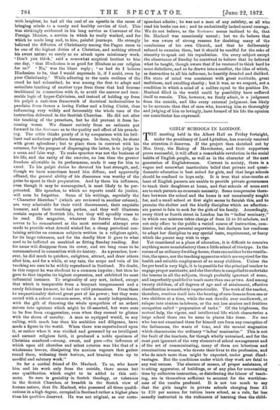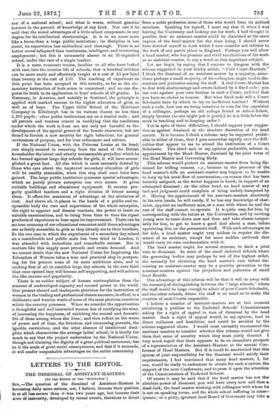GIRLS' SCHOOLS IN LONDON.
THE meeting held in the Albert Hall on Friday fortnight, under the presidency of Lord Lyttelton, has scarcely received the attention it deserves. If the project then sketched out by Mrs. Grey, the Bishop of Manchester, and their supporters prove successful, it will effect a remarkable revolution in the social habits of English people, as well as in the character of the next generation of Englishwomen. Current in society, there is a vague and somewhat inarticulate belief that private and quasi.. domestic education is beat suited for girls, and that large schools should be confined to boys only. It is true that nine-tenths at least of English parents are unable to provide private governesses to teach their daughters at home, and that schools of some sort are to such parents an economic necessity. Some compromise there- fore between the school and the home is not unnaturally sought for, and a small school at first sight seems to furnish this, and to promise the shelter and the kindly discipline which an affection- ate parent is fain to seek for the girls of his family. Accordingly, every third or fourth street in London has its "ladies' seminary," in which one mistress takes charge of from 15 to 30 scholars, and not only offers to the public a varied course of instruction, com- bined with almost parental supervision, but declares her readiness to adapt her discipline to any special taste, requirement, or fancy which the parent may wish to urge.
Yet considered as a place of education, it is difficult to conceive anything more unsatisfactory than a little school of this type. In the rooms of an ordinary dwelling-house, there can neither be the ventila- tion, the space, nor the teaching apparatus which are required for the health and suitable employment of so many children. Unless the fee per head is very high, it is impossible for the principal teacher to engage proper assistants; and she therefore is compelled to undertake the lessons in all the subjects, though probably ignorant of some, and imperfectlyqualified to teach more than one or two. And among twenty children, of all degrees of age and of attainment, effective classification is manifestly impracticable. The work of the teacher, therefore, resolves itself into the bearing of rote-lessons from one or two children at a time, while the rest dawdle over needlework, or relapse into aimless indolence, or the not less aimless and fruitless occupation called "preparation of tasks." Of the brightness, the mutual help, the vigour, and intellectual life which characterise a large school there can be none in places like these. No one who has not examined them for himself can form any conception of the listlessness, the waste of time, and the mental stagnation which characterise the ordinary "ladies' seminaries." This is not the fault of the teachers, for though wholly untrained, and for the most part ignorant of the very elements of school management and of the art of communicating, many of them are laborious and conscientious women, who devote their lives to the profession, and who do much more than might be expected, under great disad- vantages. But the conditions under which they work are fatal to any real success. The absence of means, of proper assistance, of teaching apparatus, of buildings, or of any plan for economizing time by collective instruction, or distributing the labour of teach- ing, are in themselves sufficient to account for the worthless- ness of the results produced. It is not too much to say that the girls taught in private schools charging from 23 to /10 per annum for tuition leave school, as a rule, far less soundly instructed in the rudiments of learning than-the child-
ren of a national school ; and what is worse, without genuine interest in the pursuit of knowledge of any kind. Nor can it be said that the moral advantages of a little school compensate in any degree for its intellectual shortcomings. It is in no sense more like a home than a large public institution ; its discipline is leas strict, its supervision less methodical and thorough. There is no better moral safeguard than continuous, intelligent, and interesting smployment ; but this is necessarily absent in an ill-organized .school, under the care of a single teacher.
It is a mere economic truism, familiar to all who have looked with care into the interior life of schools, that a hundred children 'can be more easily and effectively taught at a coat of £5 per head than twenty at the cost of /10. The teaching of experience on this point has been accepted in this country, so far as the ele- mentary instruction of both sexes is concerned ; and no one dis- putes its truth in its application to boys' schools of all grades. In Germany, in America, and notably in Scotland, the principle is applied with marked success to the higher education of girls, as well as of boys. The Upper Girls' School of the Merchant Company in Edinburgh has in its various classes no less than 1,200 pupils ; other public institutions are on a similar scale ; and all parents and trustees concur in testifying that the conditions 'under which the work is done are not only not harmful to the development of the special graces of the female character, but are 'found to furnish a new security for right behaviour, for general 'seriousness of purpose, and for true refinement and culture.
If the National Union, with the Princess Louise at its head, can simply succeed in removing from the mind of the British householder the latent and utterly unreasonable prejudice which he has formed against large day schools for girls, it will have accom- plished a great feat. All else which is most earnestly desired by 'those who care about the improved secondary education of girls will be readily attainable, when this step shall once have been ,gained. The large public institution possesses special advantages, 'which no purely private enterprise can ever secure. It gives :suitable buildings and educational equipment. It secures pro- perly qualified teachers and a right division of labour among them. It offers the maximum of advantage at the minimum of 'cost. And above all, it places in the hands of a public and re- sponsible body the care and supervision of the whole enterprise, the right to appoint and dismiss teachers, the power to insist on 'suitable examinations, and to bring from time to time the ripest products of experience to bear upon its improvement. There can be co true economy of our educational resources until these advantages are as freely accessible to girls as they already are to their brothers. in the one case in which the experiment of a secondary day school on a considerable and public scale has been tried in London, it was attended with immediate and remarkable success. But in smatters like this supply must precede and create demand. And we cannot doubt that the new National Union for Improving the Education of Women takes a wise and practical step in postpon- ing for the present some of its more ambitious aims, and in seeking first of all to establish large day schools, in the sure faith =that once opened they will become self-supporting, and will achieve t he like success and popularity.
There is no sadder subject of human contemplation than the amount of undeveloped capacity and unused power in the world. Our present absurd and inadequate provision for the instruction of women in the trading and professional classes amounts, in effect, to a deliberate and wanton waste of some of the most precious resources which the country possesses. When we consider the opportunities a thoughtful and well instructed woman has of rectifying the aims, of increasing the happiness, of enriching the mental and domestic ,life of those among whom she lives; and then reflect on the waste of power and of time, the frivolous and unmeaning pursuits, the ignoble curriculum, and the utter absence of intellectual disci- pline which characterise the average ladies' school, it is hardly too much to say that the project undertaken by the National Union, though not claiming the dignity of a great political movement, has tin it the seeds of great social consequences, and that if it succeeds, uit will confer unspeakable advantages on the entire community.



































 Previous page
Previous page